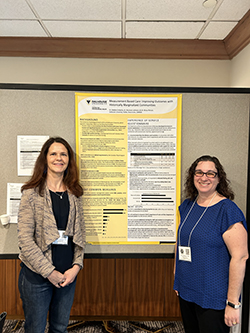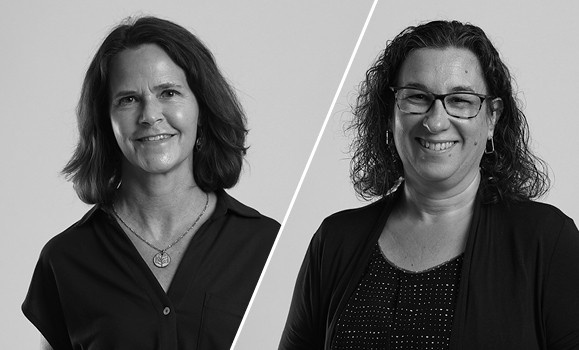Sciographies is a radio show and podcast about the people who make science happen, presented by The Faculty of Science and campus-community radio station CKDU 88.1 FM. This is the seventh article in a series that features excerpts from each new episode released this fall.
In this week’s episode, we talk to Dr. Shannon Johnson and Dr. Alissa Pencer, psychologists and co-directors of the ���ϳԹ���Centre for Psychological Health in Halifax, Nova Scotia, which recently celebrated its .
The Centre, supported by $4.5 million in provincial funding over three years, operates on a community-based clinic model, delivering psychological services to low-income clients, especially those who encounter significant barriers to accessing mental health care.
Together, Johnson and Pencer share their personal journeys, research interests, and their collaboration at the Centre.

Dr. Johnson recounts her unconventional path from engineering to psychology, driven by a deep fascination with the brain. Her academic journey began at a small liberal arts college in Michigan and led her to pursue a Ph.D. in Canada.
Growing up in Antigonish, Dr. Pencer was inspired by her father, a psychology professor. Initially drawn to developmental psychology, she later shifted her focus to studying psychotic disorders in adolescents.
Drs. Johnson and Pencer discuss their collaborative journey that led to the Centre's launch in 2023. They provide insights into its mission, their roles, and the innovative approaches they are implementing to enhance mental health care in Nova Scotia.
Here are some excerpts from the podcast, edited for clarity and length.
Barclay: Maybe we can begin with where both of you are from. Shannon, I believe you're from Kalamazoo?
Johnson: Well, I'm not from Kalamazoo, but near Kalamazoo. It's Michigan. I grew up in a small town in Southwest Michigan. I did my undergraduate in Kalamazoo College, a small private liberal arts school. I went there because I could still play varsity level sports.
Barclay: What were you excelling at?
Johnson: I played softball and basketball in my first year. Then I decided two varsity sports were not manageable. I was like, I think one's enough and basketball was what I really loved.
Barclay: You ended up completing your PhD at the University of Victoria?
Johnson. Yeah. I went to visit Victoria and I loved it. I thought it was beautiful. I love the outdoors.
Barclay: How did you get into scientific research at a liberal arts college?
Johnson: My initial goal was to be an engineer. And then because it's liberal arts, you have to take all sorts of other things. I ended up in psychology classes and I thought, well, this is kind of fun. Then I realized that you could do research and I liked that. I always had a fascination with the brain.
Barclay: Alissa, you grew up in Antigonish, Nova Scotia?
Pencer: I did. My father was a psychology professor at St. Francis Xavier University.
Barclay: Have you ever published with your father?
Pencer: No. We're in very different areas. I joke that people always said, “You followed in your father's footsteps.” And I always said, “No, no. I'm a clinical psychologist.”
Barclay: And your path to graduate school?
Pencer: I think in my first year of university, I always knew I wanted to help people.
For me, the journey started with living in a small town, having friends with mental health issues as a teenager, being a good listener back then and realizing they had no one to talk to.
Barclay: Can you summarize your PhD in like 30 characters or less?
Pencer: It was looking at substance use in adolescents with psychotic disorders
Barclay: Tell me about the launch of Dalhousie’s Centre for Psychological Health?
Johnson: In November of 2021 we started with an idea to explore a pilot project. I then pulled in [Alissa]. We worked with the Office of Addictions and Mental Health for almost two years and did a soft launch in June 2023. For about a year and a half we developed the model, what this would look like, where it would be and who we would serve. We had an excellent team including folks from Dal who were there to support us with government relations perspective and the legal and financial perspectives. It’s kind of neat to see a vision like that come to fruition.
Listen to the entire episode of Sciographies at 4:30 PM today on in Halifax or find it on , ,��and other popular podcasting platforms. You can also listen to previous Sciographies episodes on the same platforms and at dal.ca/sciographies.

